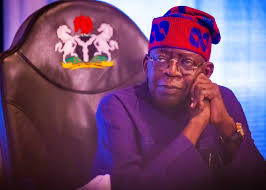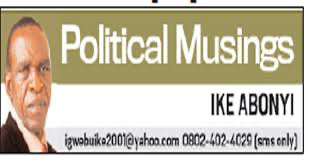New Telegraph Thursday Back page
Posted on April 7, 2022 Author Ike Abonyi
“No one ever gets to eat a mouthful by picking between another person’s teeth.” –Igbo proverb
It is a fact that the Igbo and all the people of Southeast Nigeria are marginalised. It has not been agreed, though, whether 2023 is the year of reversal of the ugly state of affairs. Naturally, the uncertainty of the year of liberation is an opportune moment for anybody, especially politicians, to gamble and try to gain advantage. The Minister of Transportation, Chibuike Rotimi Amaechi, a former governor of Rivers State, was reported to have begun the journey to the Aso Rock Villa as President in 2023. He did it in a grand style with an 86-page profile that says all the positives about his political past and present.
What strikes us in the well-packaged document is the part Amaechi declares that he is an Igbo man by birth, heritage, and ancestry. Yes, an Amaechi [Igbo loosely translated as “no one knows tomorrow”] should be an Igbo man under normal circumstances. Strangely, he has an Ikwerre kinsman and former political ally, Nyesom Wike, who is the incumbent governor of Rivers State. Wike swears by all the Ikwerre deities he is not an Igbo man.
It is Wike’s unabashed denial of his Igbo roots that makes Amaechi’s Igboness curious. Why should a Wike and an Amaechi’s tribal identity be an issue when their names and mother tongue easily give them away? Those conversant with Nigerian history know that the Ikwerre of Rivers State are Ndigbo. But the political differences between these two Ikwerre sons reached a point where they preferred to come from different ethnic groups just to help them remain apart politically. One of them will most likely change nationality if the other becomes President in 2023. It’s as bad as that … how an admixture of ambition and power drunkenness can bring out the worst in arrogant people. To build a reasonable premise and ensure a universal definition of Igbo for this conversation, I asked Google, who is Igbo? Here is the answer: “The Igbo people are an ethnic group in Nigeria.
They are majorly found in Abia, Anambra, Ebonyi, Enugu and Imo states. A sizable Igbo population is also found in Delta and Rivers states. Large ethnic Igbo populations are found in Cameroon, Equatorial Guinea, United States, Ghana, Gambia and the United Kingdom.” Google goes further to give an estimated number of Igbo nationals in the above-named countries. So from all indications, Amaechi is most likely to be in the “sizable Igbo population” that is in Rivers State. Governor Wike, if he has his way, could sue Google to establish that there is no Igbo in his state. But what is of major interest in this discourse is the sudden political potential that will make an aspiring President want to openly and unapologetically identify with Ndigbo. Why not when enough points have been cited to show that a successor to President Muhammadu Buhari in 2023 who has no Igbo blood in him will not be addressing the injustice against Ndigbo. Amaechi may have seen the point in it as weighty enough to determine the pendulum and wants to cash in on it. Nothing is wrong with that, especially for him who had not denied his igbo roots. Unlike Wike whose sudden switch to donning the red cap is irritating not a few Ndigbo.
Is Amaechi qualified to take political advantage of his Igboness? Why not, if ethnopolitics is overriding geo-politics in this instance? If the overriding determinant in arriving at who picks the APC presidential flag is ethnic, then Amaechi is well suited to being an Igbo by his assertion and underscored by Google. But if the determinant is to be by geopolitical considerations, then he is out of it and with less advantage since the South-South just finished nine years in the presidency [six years as President and three years as Vice President] during which the South East supported the South-South wholesale. Ordinarily, the Igbo of Southeast Nigeria, otherwise called the core Igbo, will prefer geopolitical considerations. However, rather than none at all, why not Amaechi? After all, the ruling party may choose to have an Igbo President to score a political point.
This is not the first time. Igbos had complained in the past that this regime has no Igbo presence at the command levels of the military and paramilitary institutions. As though in response, the Chief of Defence Staff, an Igbo officer from Delta State, was appointed to douse Igbo concerns. Even those trying to push the Central Bank Governor Godwin Emefiele into the fray are working on the feeling that Buhari might avoid the core Igbo as usual. Why not take advantage, so argue the posters of Emefiele. Native wisdom teaches that rather than let your stray cow escape without trace, you can nip the tail at least. That is another way of saying that one half loaf of bread is better than none at all. Therefore, Ndigbo will jump at an Amaechi in 2023 if he is the only Igbo on the presidential ballot in the two leading political parties.
If the main opposition PDP fails to adequately appreciate the Igbo backing since 1999, party loyalty will suffer a serious setback in the Igbo political realm in 2023. This fact requires no visionary to explain. After all, Brendon Burchard, the American author of the book, High Performance Habits, admonishes, “If they lack gratitude, they should lack your attention. Give your energy to those who appreciate you.”
A loyalist should not be pushed to the point where he or she queries and moves to determine loyalty. PDP is at the point of doing just that ahead of 2023 but it needs to know that it has unpleasant consequences that can be far-reaching. For the Igbo, 2023 provides ample opportunity to review their political behaviour in Nigeria’s electoral system. The time has come for them to stop and think if their loyalty is being expected instead of being appreciated.
The time is now for the Igbo to prove PDP wrong that they will always be there for it. Sometimes, it’s self-evident that the only way to attract attention to what you do is to stop doing it. After all, Ndigbo are wise enough to know not to keep planting flowers in people’s compounds who have no interest in manuring and watering them. But for Amaechi, having established that he can get Igbo votes in the absence of a South-East Igbo running, the onus still rests on him to prove that he indeed deserves Igbo votes, not on ethnopolitical sentiments alone. At one point, Nigerians were wondering whether the Federal Ministry of Transportation was of Nigeria or Daura. All critical projects of his ministry were sited up north, Katsina in particular. It was not unexpected that the Daura Emirate reciprocated with a turban officially making Amaechi a friend of the Emirate. Now that he has remembered his Igbo roots ahead of 2023, what did the Igbo son from Ikwerre do for his people. Answers to such questions will influence votes better than the ethnic card he is playing.
For instance, railway services across Nigeria and the Niger Republic [where PMB’s cousins come from] for which Amaechi enjoys a lot of credit, none are seen in Igbo land. The eastern line, one is the oldest If Amaechi hopes to enjoy his ethnic card, he must prepare to showcase his achievements in concrete terms. Not to do that but hope to be an Igbo man for purposes of 2023 is bound to be counterproductive. In comportment, Amaechi has improved significantly on his past behaviour. Since he started dreaming of the Villa, he has learnt to talk less and be less controversial, unlike his non-Igbo kinsman from Ikwerre whose presidential dream has turned his head a round made him a bull in a china shop. What Amaechi has done really by correctly identifying with his Igbo rootss even if it’s for politics is to underscore the Igbo political brand as critical in the 2023 journey notwithstanding the “janjaweed” assertion of the confused Lagos-based political pastor Tunde Bakare.
He took to the pulpit to fabricate lies about a curse on Ndigbo and hopes to be free of it before God. By this declaration Amaechi has joined himself with his brothers from the South East, the likes of Senate Chief Whip Orji Uzo Kalu, Ministers of Science and Technology Ogbonna Onu, Health Minister Chris Ngige, Minister of State for Education, Emeka Nwajiuba, Rochas Okorocha, and, of course, Dave Umahi, governor of Ebonyi State…all well qualified for the exalted office of the President. Since it’s now well established that the South East is glaringly favoured by the justice of the case in question, it would be curious to know why President Buhari as an elder statesman will be leaving the centre for the periphery. It’s a fact that the political relationship between the South East and PMB has been anything but cordial. However, if he chooses to be a statesman, the President should consider stabilising the polity and enthroning justice and equity. By so doing he will give not a few Igbo one reason to still believe in him. After all, at his age and being a huge beneficiary of God’s extravagant divine favour and grace, despite his foibles, ruling his country twice, vengeance should not be found anywhere near his box. Instead, he should be magnanimous with justice and fairness as guiding principles. God, help us.





